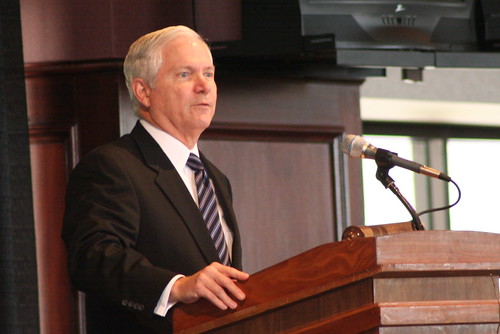Police authorities in Dubai have banned protests and demonstrations concerning the Iranian elections, hoping to avoid the possibility of a clash between pro-government and pro-reformist factions. Lieutenant-General Khalfan Tamim, Chief of the Dubai Police, said that Emirati officials “don’t want a power struggle” fought on Dubai’s soil, where over 500,000 Iranians reside. Tamim also noted that the Iranian ambassador asked him to break up protests by any means necessary but that the Dubai police had refused to use force because they “always deal with such matters in a civilized manner.” The United Arab Emirates is one of only a handful of nations that officially congratulated President Mahmoud Ahmadinejad on his electoral victory. The protest ban preceded Iranian Grand Ayatollah Ali Khamenei’s Friday sermon that demanded an immediate end to raging street protests in Tehran and expressed the religious leader’s unwavering support for Ahmadinejad.
 An outbreak of the bubonic plague has been reported on the border between Libya and Egypt, according to the Associated Press. Although the outbreak has not yet been confirmed by the World Health Organization (WHO), Libyan authorities have already reported one fatality caused by the plague. Over 4,000 Egyptians living in the Libyan province of Tabruq, where the plague is suspected to have originated, have attempted to flee back into Egypt. Today, the Egyptian daily Al-Mesryoon reported that the plague, usually transmitted through wild rodents and fleas, may have stemmed from the biological waste of a Libyan arms warehouse. Libyan government officials have refused to provide Egyptian and WHO authorities information regarding the plague and have denied access to experts fearing that international organizations would, under false pretenses, search for Libya’s biological and germ weapons. Libyan border guards have detained a number of fleeing Egyptians due to non payment of “departure fees” that were enacted by authorities four days ago, without prior notice.
An outbreak of the bubonic plague has been reported on the border between Libya and Egypt, according to the Associated Press. Although the outbreak has not yet been confirmed by the World Health Organization (WHO), Libyan authorities have already reported one fatality caused by the plague. Over 4,000 Egyptians living in the Libyan province of Tabruq, where the plague is suspected to have originated, have attempted to flee back into Egypt. Today, the Egyptian daily Al-Mesryoon reported that the plague, usually transmitted through wild rodents and fleas, may have stemmed from the biological waste of a Libyan arms warehouse. Libyan government officials have refused to provide Egyptian and WHO authorities information regarding the plague and have denied access to experts fearing that international organizations would, under false pretenses, search for Libya’s biological and germ weapons. Libyan border guards have detained a number of fleeing Egyptians due to non payment of “departure fees” that were enacted by authorities four days ago, without prior notice.
Somalia’s Security Minister, Omar Hashi, was killed yesterday along with 34 others in a suicide bombing carried out by the al-Shabab Islamist insurgency group. The minister, as well as Somalia’s former ambassador to Ethiopia, was meeting colleagues at a hotel in Beledweyne, a city north of Mogadishu, when the attack occurred. Al-Shabab immediately claimed responsibility for the attack saying that the “apostates” had successfully been “eliminated by our mujahidins.” Despite the latest attack, Somalia’s Foreign Minister Mohammed Omaar told Al Jazeera that al-Shabab has “failed completely” in taking over Mogadishu and that the Somali government will hold onto the capital as the Somali people “are tired of twenty years of conflict” and ready for peace. Since May, over 330 civilians have been killed in government clashes with al-Shabab and its allied group Hizbul Islam. The rebels now control most of southern Somalia.
 The United States announced yesterday that it was monitoring a North Korean ship carrying weapons and that it had redeployed anti-missile assets to the Pacific, as a “precaution” against a North Korean missile launch. Defense Secretary Robert Gates said that Washington was concerned about the possibility of a North Korean missile launch directed towards Hawaii but added that America was “in a good position” to protect the islands. Gates’ remarks came a day after several Japanese newspapers reported that North Korea was prepared to test fire a long-range missile from its Tongchang-ri facility over Japan towards Hawaii on or around July 4. Pyongyang has warned ships to “stay away from waters” off of the eastern city of Wonsan, a possible indication of an imminent missile test, said a Japan Coast Guard spokesman. Since UN sanctions were imposed on North Korea last week, Pyongyang has said it will begin a uranium enrichment program and will weaponize enough plutonium to create at least six nuclear bombs. North Korea has demanded an apology from the international community regarding the sanctions.
The United States announced yesterday that it was monitoring a North Korean ship carrying weapons and that it had redeployed anti-missile assets to the Pacific, as a “precaution” against a North Korean missile launch. Defense Secretary Robert Gates said that Washington was concerned about the possibility of a North Korean missile launch directed towards Hawaii but added that America was “in a good position” to protect the islands. Gates’ remarks came a day after several Japanese newspapers reported that North Korea was prepared to test fire a long-range missile from its Tongchang-ri facility over Japan towards Hawaii on or around July 4. Pyongyang has warned ships to “stay away from waters” off of the eastern city of Wonsan, a possible indication of an imminent missile test, said a Japan Coast Guard spokesman. Since UN sanctions were imposed on North Korea last week, Pyongyang has said it will begin a uranium enrichment program and will weaponize enough plutonium to create at least six nuclear bombs. North Korea has demanded an apology from the international community regarding the sanctions.